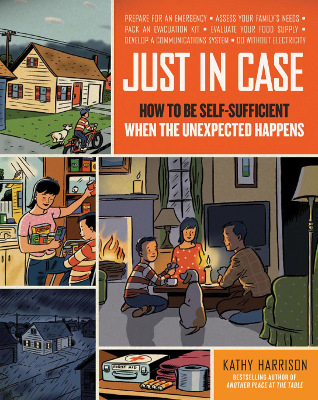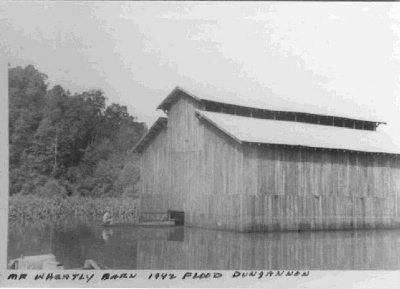
Just in Case
 Just
in Case: How to be Self-sufficient When the Unexpected Happens, by Kathy Harrison, is a
good introduction to preparedness, especially for those of us who don't
particularly expect an apocalypse and just want to make sure we're
ready for more mainstream disasters. As with any book of this
type, you have to tweak the information to match your own lifestyle ---
I ignored all of the information about teaching your kids to go down
fire ladders and so forth, and I wouldn't use any of her very-grainy
recipes. On the other hand, I especially enjoyed the few tidbits
the author presented about her own childhood, during which children
bathed infrequently and were expected to rinse out their own underwear
and socks in the sink every night. And I think she was wise to
focus on learning skills, since stocking up on emergency supplies does
little good if you don't know how to use them.
Just
in Case: How to be Self-sufficient When the Unexpected Happens, by Kathy Harrison, is a
good introduction to preparedness, especially for those of us who don't
particularly expect an apocalypse and just want to make sure we're
ready for more mainstream disasters. As with any book of this
type, you have to tweak the information to match your own lifestyle ---
I ignored all of the information about teaching your kids to go down
fire ladders and so forth, and I wouldn't use any of her very-grainy
recipes. On the other hand, I especially enjoyed the few tidbits
the author presented about her own childhood, during which children
bathed infrequently and were expected to rinse out their own underwear
and socks in the sink every night. And I think she was wise to
focus on learning skills, since stocking up on emergency supplies does
little good if you don't know how to use them.
I'll make another post
later about some changes we plan to make to our own lives in response
to this book (and to our
recent power outage),
but for now, I thought you might enjoy thinking through which disasters
you're likely to have to deal with. Power outages  are a matter of course for us
(since we've spent about 1% of our time on the farm in the dark), and a
thousand-year flood could potentially impact our core homestead.
Tornadoes hit our area with moderate regularity (although they seldom
dip down into coves like ours) and house fires are always a
possibility. Other disasters Harrison suggests we consider
(although Mark and I are less concerned about them) include heat waves,
winter storms, wildfires, thunderstorms, landslides, hurricanes,
earthquakes, tsunamis, chemical hazards, nuclear hazards, pandemics,
and terrorism. Which kinds of emergencies do you prepare for?
are a matter of course for us
(since we've spent about 1% of our time on the farm in the dark), and a
thousand-year flood could potentially impact our core homestead.
Tornadoes hit our area with moderate regularity (although they seldom
dip down into coves like ours) and house fires are always a
possibility. Other disasters Harrison suggests we consider
(although Mark and I are less concerned about them) include heat waves,
winter storms, wildfires, thunderstorms, landslides, hurricanes,
earthquakes, tsunamis, chemical hazards, nuclear hazards, pandemics,
and terrorism. Which kinds of emergencies do you prepare for?
(The photograph above is
from a neighbor who
reports that a flood in 1977 made it up to our barn. This barn isn't ours, though, but one that once stood across from our mailbox.)
Want more in-depth information? Browse through our books.
Or explore more posts by date or by subject.
About us: Anna Hess and Mark Hamilton spent over a decade living self-sufficiently in the mountains of Virginia before moving north to start over from scratch in the foothills of Ohio. They've experimented with permaculture, no-till gardening, trailersteading, home-based microbusinesses and much more, writing about their adventures in both blogs and books.
Want to be notified when new comments are posted on this page? Click on the RSS button after you add a comment to subscribe to the comment feed, or simply check the box beside "email replies to me" while writing your comment.

Because I learned yesterday of an 85plus old friend of my 80 yr old friend recently was found having fallen at night and not having been aware enough to use her Lifeline, so was caught under a bureau drawer all night on the floor, until she was found by the person coming in to fix her breakfast, I think that natural disasters pale beside the sudden health problem that can strike. Hard to live completely alone in a fairly isolated place.
I do think that it is necessary to stay in touch with neighbors, esp. to be available to them, if they need help. I also think that a battery-operated, or some alternative-powered radio is good to have. Maybe even a radio system between you and your "movie star" neighbor, for mutual aid?
The chief thing, is not to risk too much if you are pretty isolated. Accidents do happen on a farm! I remember once when I foolishly ripped the calf of my leg open, getting over a rusty barbed-wire fence. Completely avoidable injury.
I also think that we sometimes are our own worse enemies. Maybe we should get used to no power once a week, and get used to a pwer-free routine! (power-free is not powerless!) I was glad your phone was working, Anna, in your last outage. But of course there are times when phones don't work! I guess it's important to have a plan, for connecting with relatives, and how they connect with you...